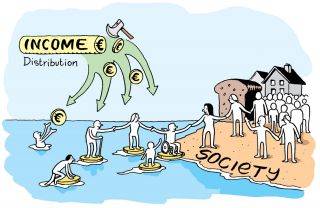15% of all those in poverty in Ireland have a job while a quarter are children

Poverty Focus 2021 analyses the contribution that increases to welfare payments and supports have made to recent reductions in the headline poverty risk measure. While progress in reducing poverty is welcome, Government’s failure to raise core social welfare rates in the last two Budgets will see this progress reversed. It is essential that Government policy reasserts a focus on welfare increases and supports for households on the lowest incomes.
Social Justice Ireland has consistently argued for the prioritisation of low income welfare dependent families in Budgetary policy and as our findings show, prioritising these families works, and leads to reductions in poverty.
Poverty Focus - main findings:
- Although the number of people in poverty is much the same as a decade ago, the period from 2016 onwards has been one of notable decline in the level of poverty risk. This has seen the proportion of the population in poverty fall from 16.2 per cent in 2016 to 12.8 per cent in the latest SILC survey.
- Social Justice Ireland’s analysis of the income distribution effects of recent Budgets highlights these effects. Looking at the entire period from 2017 to 2021 budgetary policy resulted in all household types recording an increase in their disposable income.
- The larger gains experienced by welfare dependent households explain much of the reasons why the levels of poverty and income inequality have fallen in recent years.
- Social Justice Ireland warmly welcomes this progress. It reflects a dividend from budget policy over the period which, for the most part, distributed resources more generously to welfare dependent households. Our consistent message in advance of these Budgets was to reverse the regressivity of previous policy choices and to prioritise those households with the least resources and the most needs.
- However, the analysis also reveals that the two most recent Budgets have shifted away from this approach. Much of this recent progress will be reversed unless policy reasserts a focus on welfare increases and supports for those households on the lowest incomes.
Poverty Profiled: the main groups
One in every eight people in Ireland lives with an income below the poverty line; about 630,000 people (12.8 per cent of the population).
Table 1: Poverty Profiled: the main groups | ||
Group | Proportion of population in poverty | |
Children (under 16 yrs) | 26.1% of all those in poverty | |
Workers | 15.4% of all those in poverty | |
Those on home duties (e.g. parents & carers) | 13.4% of all those in poverty
| |
Those unable to work due to illness/disability | 12.3% of all those in poverty | |
The Unemployed | 10.9% of all those in poverty | |
Students & school children (16yrs+) | 10.6% of all those in poverty | |
The Retired | 9.9% of all those in poverty | |
Source: CSO SILC Survey 2019 |
| |
Budget Priorities
In 2021, as we plan future budgetary priorities, it is important that adequate levels of social welfare be maintained to ensure that the mistakes of the past are not repeated. The annual cost of the consequences of poverty to Ireland is almost €4.5bn[1].
Put simply, €1 in every €20 collected by the state from taxes, social insurance and charges ends up being allocated by the state to make up for the way that poverty damages people’s lives. People on low incomes are more likely to suffer from chronic illness and children living in poverty have poorer educational outcomes. Investing in low income welfare dependent families by increasing social welfare rates would reduce this cost to the state. It would help us reach our poverty targets and ensure a better quality of life for those families.
While there is hope for the future as the pandemic slowly recedes, the reality of life on a low income will remain the norm for a large proportion of our society. Prior to the current public health crisis, one in every eight people in Ireland lived with an income below the poverty line; about 630,000 people. Looking ahead, these numbers look set to rise as the very uneven impact of the Covid-19 crisis unfolds.
Reducing Poverty – policy priorities
If poverty rates are to fall in the years ahead, Social Justice Ireland believes that the following are required:
- increase in social welfare payments.
- equity of social welfare rates.
- adequate payments for children.
- refundable tax credits.
- decent rates of pay for low paid workers.
- a universal state pension.
- a cost of disability payment.
[1] https://www.svp.ie/news-media/publications/social-justice-publications/…

GIVING A VOICE TO THOSE
WHO DON’T HAVE A VOICE
When you support Social Justice Ireland, you are tackling the causes of problems.
